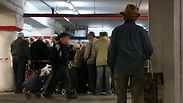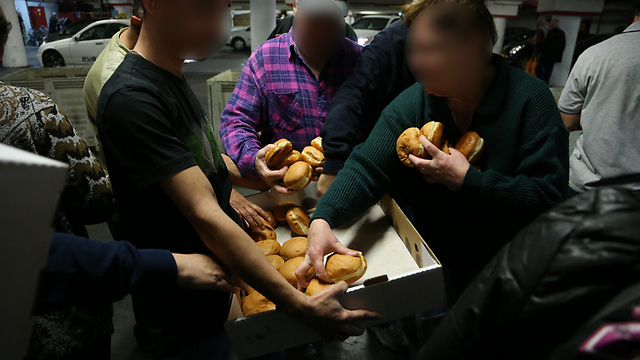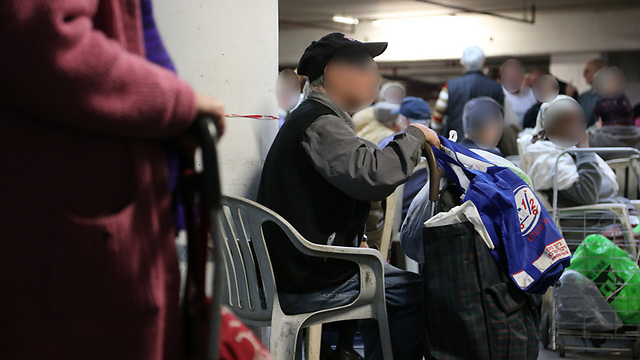
Every week hundreds of people, mostly elderly, have converged in a food distribution center.
Clara, an 80-year-old from Ramat Gan, joined a large crowd Thursday in a parking lot under a large commercial center in Rishon Letzion. "I came here to get food, because between my rent and medicine, my money isn't always enough," she said.
As shoppers enjoyed the range of products on display, these people arrived to receive food for Shabbat from the "Pitchon Lev" organization. "The country should not forget us," Clara said.
The bare numbers of the reports by the National Insurance Institute and the Taub Center for Social Policy Studies shed light on the daily reality for these visitors. Many of them were elderly people from post-Soviet countries. Clara, who immigrated to Israel from Uzbekistan two decades ago, lives with her 81-year-old husband in Ramat Gan. "In Uzbekistan I was a teacher, but I didn't save up for my pension, and didn't get one in Israel," she said.
The couple has been receiving an old-age benefit of NIS 4,300 a month and a guaranteed income of NIS 1,000. Despite Clara's economic instability, she has not lost her sense of optimism. "Thank God we have hands and feet and are healthy," she said. "We are not spoiled. We don't buy clothes, don't throw bread away, and eat what we have. I am grateful to the country and love it. I'm happy I came here."
Eti, a 76-year-old from Tel Aviv, waited in the line for food as well. "My husband was sick and had surgery, and we're 6,000 shekels in debt to the bank, and no one wants to give me a shekel for Shabbat. Every month we have to buy medication for more than 1,000 shekels, and we can't handle it. Our children are struggling themselves and can't help us."
Eti and her husband's income totaled NIS 6,000. "We haven't completed our mortgage payments, so the money isn't enough. I feel ashamed about coming here. I hide to the side so no one I knows sees me."
The underground parking lot also saw younger people. Yaffa, 60, lived in Tel Aviv and was a single mother to a soldier who worked part time caring for the elderly and received a disability benefit. She earned a total of NIS 4,000 a month. "I don't buy anything for myself, and I can't help my son in the army," she said. "Apparently no one really cares about the people standing here. I see the high-rises in Tel Aviv and don't understand what all that is for, when people who come here don't have money for food."
"We must immediately raise the minimum wage," said MK Miri Regev. "When people have to choose between food and medicine, they're in an impossible situation. I hope the government raises the minimum wage as soon as next week."
We don't need reports to see and understand the hardships faced by Israel's poor," said Nissim Zioni, the founder of Pitchon Lev.
"Every Thursday hundreds arrive Pitchon Lev's distribution centers, and we don't have enough resources to help everyone. The only solution to this dire situation is passing a law creating a government body to concentrate national care for the poverty problem and to implement a comprehensive program for eradicating poverty. Without a law, the issue will be pushed to the margins."

















